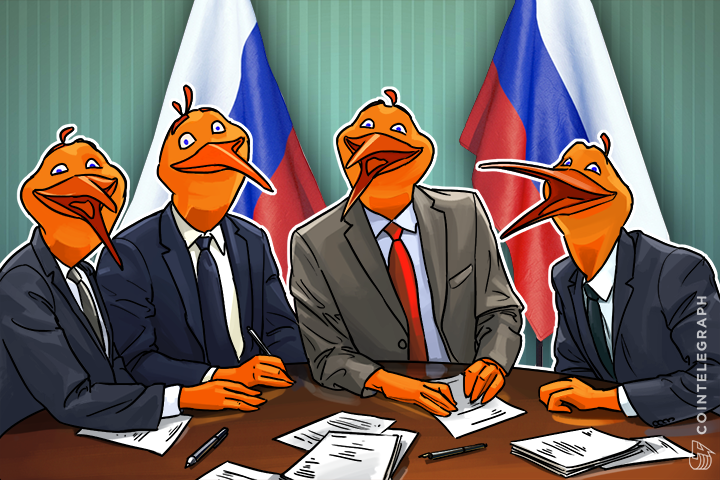Recognizing the potential for development of Blockchain technology in the country, Russian payment operator Qiwi is seeking to establish a consortium of banks similar to the New York-based R3.
Cointelegraph spoke to Konstantin Koltsov, Corporate Relations Director at Qiwi, to learn more about the initiative of the company, which believes “that in 5 years from now on we will have totally different types of payments because of Blockchain”.
A hot topic
Digital currencies and Blockchain technology remain quite controversial topics in Russia, spurring heated debates among opponents and advocates of such innovations.
While state authorities cannot make up their minds whether to love or hate bitcoin and everything that is related to Bitcoin, i.e. Blockchain, businesses in Russia have been expressing their interest in the development of the technology and its application.
Konstantin Koltsov says about the application of Blockchain:
“Topics around Blockchain technology are getting more and more interest in the country, and the overall trajectory of debates is changing. At the moment Blockchain technology is getting more acceptance by the majority of discussants, as the potential for financial and non-financial sectors of the market is getting more recognition.”
Explore it, not ban it!
The situation with digital currencies, however, is different. For the last few months a lot of opinions concerning the future of digital currencies in the country have been expressed, ranging from the call to research it to the intention to ban it, as it harms the country’s financial system.
However, at the international conference “Digital currency in the light of current legal and economic challenges” that took place in Moscow earlier this month, discussants raised an important concern about a total ban on digital currencies. Everyone agreed that if digital currencies were banned, the country’s financial sector would fail to benefit from Blockchain technology.
Koltsov says to Cointelegraph:
“As far as we know, participants of the conference came to an agreement that digital currencies should be studied, not banned. The Head of the Duma’s interdepartmental working group for risk assessment of cryptocurrencies, Elina Sidorenko suggested application of digital currencies as a universal payment tool.”
Russian state authorities have repeatedly expressed their intention to ban digital currencies and introduce criminal responsibility for any operations with bitcoin.
In May, the Ministry of Finance submitted a draft law about the ban of cryptocurrencies, its mining and any operations with it to the Ministry of Justice. The latter, however, has expressed disagreement with the text of the draft law, and a number of definitions, particularly with what is considered to be ‘quasi-money’. State authorities opposing the very idea of digital currencies often use this term when referring to Bitcoin.
When the first version of the draft law was submitted by the Ministry of Finance, authorities from the Ministry of Justice had expressed concern about the need to introduce such harsh conditions for the use of Bitcoin such as imprisonment and extensive fines, as the level of harm posed by digital currencies is questionable.
Russian businesses want to “befriend” the Blockchain
Russian businesses are developing their relationship with the Blockchain quite rapidly.
Koltsov says to Cointelegraph:
“Possibilities for application of the Blockchain are vast both in financial and non-financial sector. We at Qiwi are testing a new type of payments processing based on Blockchain technology.”
The establishment of a consortium of banks is a step which would undoubtedly accelerate the development of standards for application of Blockchain technology. Reportedly, Qiwi has sent invitations to Russian biggest banks, including B&N Bank, Alfa Bank, and the country’s largest bank - Sberbank.
However, it is still unclear what other institutions could be invited to join the consortium, what would be the main strategy, and how communication and cooperation would be organized. Whether the consortium would get support from the state is also yet to be seen.
Legal aspects
The development of regulatory framework addressing the area of financial services, including mobile and e-payments, is a sore subject in the country. The European Commission has introduced a Revised Payment Services Directive (PSD2) seeking to improve the level of security of all types of payments and develop innovative forms of financial services.
It is believed that the directive will revolutionize the European financial infrastructure, with banks and financial institutions encouraged to seize the opportunity to revise their operation logic.
Bearing in mind that Russia has always been in the position of a pursuer rather than a leader when it comes to setting development trends in any sector, the establishment of a consortium of banks might be an influential step in getting the voices of the financial sector heard.
Qiwi: In Blockchain we trust
Blockchain technology is one of the most innovative technologies of the last decade. It is expected to change the way things work, and not only in the area of finance.
Qiwi believes that Blockchain will provide an efficient solution to the problem of trust.
Koltsov explains:
“Blockchain can significantly reduce the number of middlemen in any kind of processes and operations. It is applicable in the financial and non-financial sector. Blockchain is characterized by the high level of security. The technology has proved to be resistant to a variety of attacks, therefore the potential for its application in different spheres is vast. The question is what spheres would be brave enough to play with it. Fintech is brave enough.”


